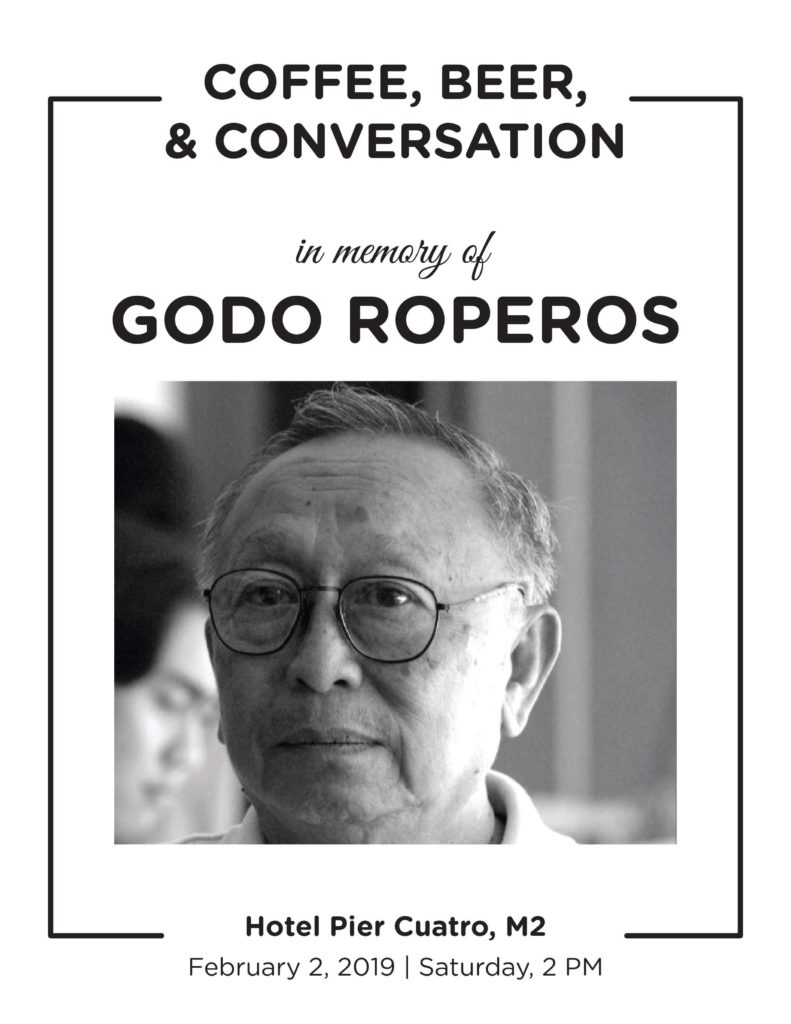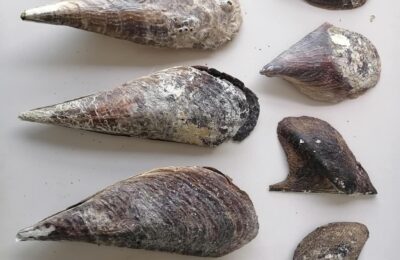The publication of an October 16, 2024 news report saying marine biologists from the Cebu Technological…
Godofredo Roperos: A long love affair with writing
Godofredo M. Roperos died 10 a.m., Monday, Jan. 28, 2019, following a bout with pneumonia. He was 88.
Eldest daughter Maria Fe said the veteran writer passed away at the Chong Hua Hospital Mandaue, where he was brought 19 days earlier.
Internment will be on Feb. 2, Saturday, at the Manila Memorial Park in Liloan, Cebu, following a 1 p.m. requiem mass at the San Fernando Rey Parish.
Journalists in Cebu City, meanwhile, will hold a tribute of their own at the Hotel Pier Cuatro, North Reclamation Area, 2 p.m. of the same day, featuring the things that he liked in life: coffee, beer and conversation.

Home
Roperos spent his final years in Balamban, Cebu.
“He really loved Balamban. After he retired in 2014, he decided to live there. We’d just visit or pick him up,” Maria Fe said. The rest of the family lived closer to the city, in Liloan.
Balamban was where he was born and raised. He often recalled enjoying the sea and the low hills at the back of the town as a youth.
And it was where he first fell in love with the written word; a love that permeated in his writing.
He first fell in love with writing in his hometown Balamban. That love fills and shows in his writing. The book ‘Bald Mountain’ is a collection of his short stories in English. He also wrote in Cebuano.
“His technique blends the sentimental, the imaginative and the tragic with cathartic effect, the readers being taken to the basal realities of Philippine life close to the soil, and invited to recognize himself and his roots,” once wrote Robert Picart, then of Ateneo de Manila University’s Department of English, of Roperos.
Writing thirty
On the subject of death, Roperos penned in March 2012 how “we are never able to anticipate what would happen next in our lives — when it’s time to write 30.” Thirty is journalese for the end.
He’d written it in “painful remembering” to his fellow journalist and friend Isagani Yambot, publisher of the Philippine Daily Inquirer, who had died that month.
Two years later, Roperos would stop writing his column because his own health had started to fail.
“He wrote until he couldn’t,” said Maria Fe.
While he could, his work crossed genre: reporting, feature writing, short stories.
Though better known among his newspaper audience for his column Politics Also, Roperos was a prolific, bi-lingual writer whose work crossed genre — journalism, feature-writing, short stories.
On the latter, he published an anthology and entitled Bald Mountain and Other Stories, reflecting his rustic experiences.
Of death, he wrote in his book: “There will always be… death wherever man is, wherever life exists (The boy who knew death).”
And in the sequel (The burial), he continued: “All of us will die — no one is an exception — sooner or later our turn will come. Death ends our misery on earth and the burden of living.”
Long love affair
In a tribute piece published last January 30, Sun.Star Cebu said Roperos, as a student in UP Diliman in the ‘50s, “belonged to that batch of emerging voices in English literary writing” that called themselves The Ravens.
Together with Andres Cristobal Cruz, Adrian Cristobal, Hilario Francia, Elmer Ordoñez, Bernardo de Leon Jr., Armando Bonifacio and others, they would later publish three volumes with Nick Joaquin, the national artist.
Roperos recalled those days in many conversations with young reporters.
He was president of the UP-Writer’s Club and editor to its Literary Apprentice, while writing short stories for the Philippine Free Press and, later, editing the Sunday Times Magazine of the Manila Times.
Versatile
Straight news or news features, Roperos was excellent in both.
In 1963, the National Press Club-Esso National Journalism Awards gave him First Prize in General Reporting for a front-page piece about the crash of a Philippine Air Lines plane in Malalag, Davao del Sur in March 1963, which killed all 27 passengers.
Two years before that, he also won Second Prize in magazine Writing for his feature “The Filipino Farmer and his Grain of Rice” published in the Manila Times.
When Marcos’s Martial Law was imposed and newspapers were closed in 1972, Roperos got hired as technical assistant then Press Secretary Kit Tatad, a writer whose pieces Roperos sometimes rejected at the Sunday Times Magazine.
He later got assigned as regional director of the powerful Department of Public Information.
When Martial Law was finally over, Roperos found himself writing in what was then Sun.Star Daily.
Archived
Beyond his book and his columns, some of which have been rendered in digital and are publicly available, he remains relevant especially to journalism and communication students in Cebu, where his research on the development of the Cebu press is required reading.
Godo — he once introduced himself to beat reporters as GM Roper — is survived by his wife, Dolores, sons Raul and Joachim, and daughters Maria Fe and Maria Esperanza.
He is blessed with ten grandchildren — Leon Philippe, Lemuel Paul, Euka Maria, Kara Maria, Louise Pietro, Kevin, Matthew, Trisha Maria, Kadesh and Isaac — and one great granddaughter, Kiana Sophia.




